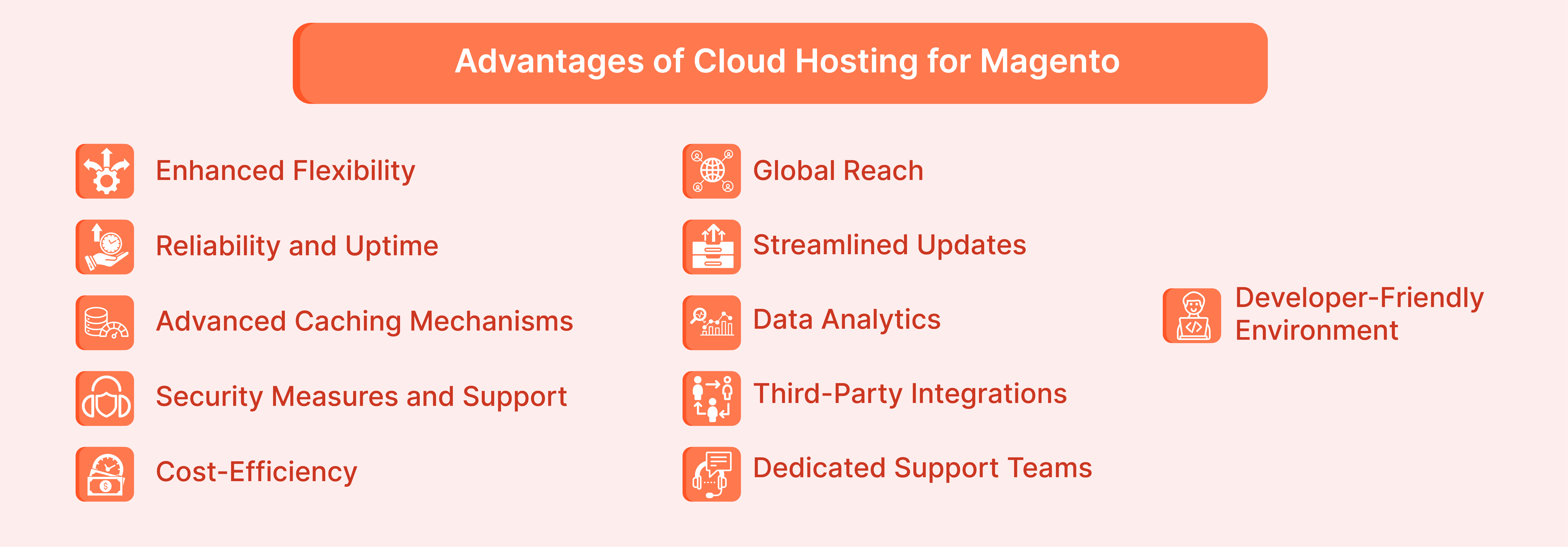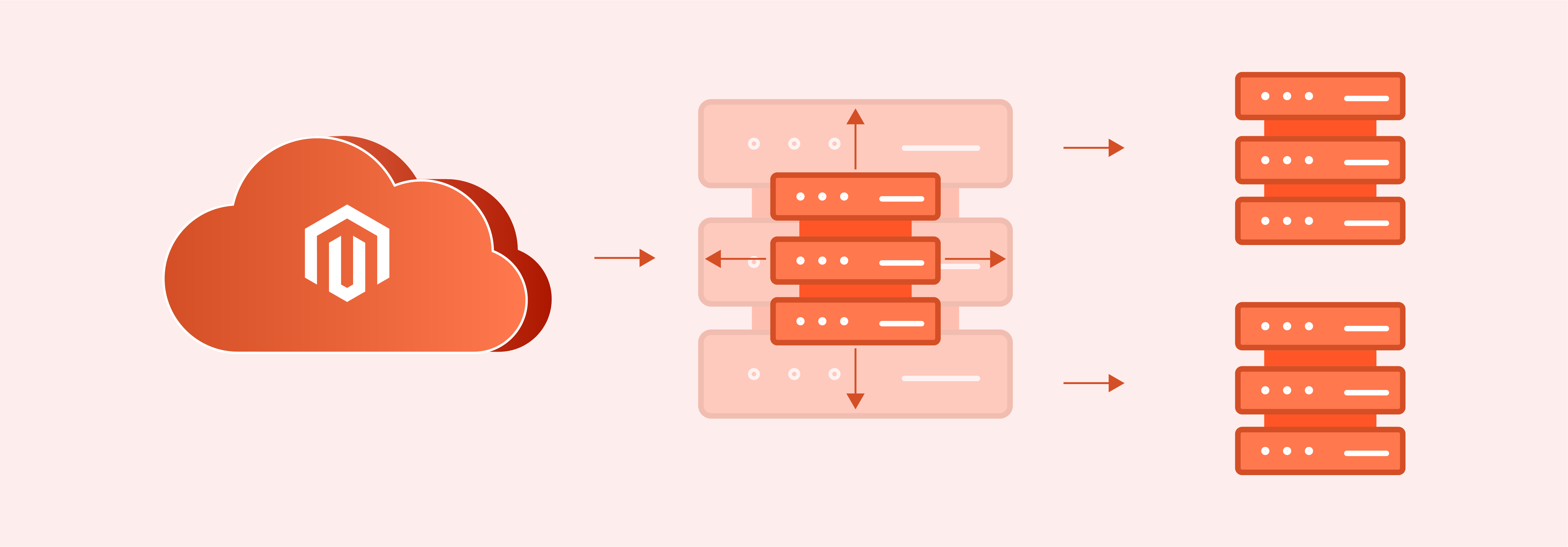
Optimizing Cloud Hosting Magento: Setup and Cost Benefits
Cloud hosting Magento platform leverages the power of cloud computing to provide a highly scalable and flexible hosting environment specifically designed for Magento websites. It's designed to scale and adapt easily, ensuring peak performance, dependability, and protection for your online store. This guide will walk you through essential cloud hosting features to help you choose the ideal provider. It will also provide instructions for establishing a cloud hosting setup for your Magento store to guarantee efficiency.
Key Takeaways
-
Discover how Magento Cloud Hosting utilizes distributed resources for a smooth-running online store and quick customer access.
-
Explore the benefits of Magento Cloud Hosting, including enhanced flexibility, reliability, and advanced caching mechanisms, to optimize Magento website performance on cloud hosting.
-
Learn how to set up a Magento store in the cloud, from choosing the right hosting provider to configuring security and enabling efficient scalability.
-
Explore the key system requirements for running Magento on cloud hosting, focusing on CPU, RAM, operating system compatibility, etc.
-
Discover how cloud hosting for Magento reduces costs by leveraging comprehensive support plans.
What is Magento Cloud Hosting?

Magento Cloud Hosting is a flexible solution for e-commerce platforms that use distributed resources. It ensures a smooth-running online store, quick customer access, and Magento scalability per your needs. This hosting type impacts website performance and user experience. It comes with options like public, private, and hybrid clouds, allowing easy scaling based on traffic and sales.
Your Magento site on cloud hosting is spread across virtual servers in multiple data centers. It enables seamless resource allocation and load balancing. It helps ensure your site handles traffic spikes without Magento downtime or issues. It also offers caching, backups, and reliable security.
Choosing services like Magento Commerce Cloud gives you dedicated teams for smooth operation, fast page loading, and efficient inventory management.
Advantages of Cloud Hosting for Magento

-
Enhanced Flexibility: Magento 2 cloud hosting optimizes website performance, ensuring faster load times. It utilizes distributed resources, allowing your online store to run smoothly and provide a seamless shopping experience for your customers. It offers the flexibility to scale your resources up or down as needed. Vertical scaling involves increasing the capacity of your existing server, while horizontal scaling involves adding more servers to your infrastructure.
-
Reliability and Uptime: Hosting your Magento website on a network of virtual servers across multiple data centers ensures high reliability and minimal Magento downtime. Your site remains accessible to customers at all times, contributing to a positive user experience. It also optimizes resource allocation and load balancing to handle sudden spikes in traffic. It ensures that your store remains responsive even during peak demand.
-
Advanced Caching Mechanisms: Magento cloud hosting has advanced caching mechanisms, improving website speed and responsiveness. Caching stores frequently access data, reducing the need to fetch information from the server. It offers automatic backup solutions, safeguarding your valuable data. Regular backups ensure your online store's information is protected, and you can quickly recover from any unexpected issues.
-
Security Measures and Support: Cloud hosting for Magento includes robust security measures to protect your store from threats and attacks. It includes firewalls, SSL certificates, and monitoring services to protect your data. They adhere to security compliance standards. It makes it easier for your online store to meet regulatory requirements and protect customer data.
-
Cost-Efficiency: Cloud hosting allows you to pay for the resources you use, making it a cost-effective solution. There's no need for substantial upfront investments in hardware. You can adjust your resources as your business grows. With cloud hosting, you can easily adjust your resources based on demand. This elasticity allows you to efficiently manage seasonal spikes in traffic or unexpected surges efficiently, ensuring a consistent user experience.
-
Global Reach: Cloud hosting providers often have data centers in multiple regions and countries. This global reach ensures that your website can serve customers worldwide efficiently. This geographic redundancy minimizes the risk of data loss in case of hardware failures or disasters.
-
Streamlined Updates: Cloud hosting providers often handle server and software updates, ensuring that your Magento platform stays updated with the latest features and security patches. It saves you time and effort in managing these updates yourself. It simplifies collaboration among developers and teams. Features like version control and collaboration tools facilitate efficient teamwork in managing and enhancing your Magento store.
-
Data Analytics: Many cloud hosting platforms provide integrated analytics tools that offer insights into your website's performance, visitor behavior, and sales trends. These insights can help you make informed decisions to improve your online business. It is also more environmentally friendly compared to traditional hosting solutions. Cloud providers use data centers and resource allocation, reducing the carbon footprint of your e-commerce operations.
-
Third-Party Integrations: Cloud hosting easily integrates with third-party services and tools. It allows you to expand your e-commerce capabilities with various Magento plugins, extensions, and applications. It enables you to connect and integrate your Magento store with other software and services, such as payment gateways, inventory management systems, and CRM software.
-
Dedicated Support Teams: Opting for services like Magento Commerce Cloud provides you with dedicated support teams. These experts are committed to keeping your online store running smoothly. They assist with fast-loading page optimization and efficient inventory management. They also help with daily or even hourly Magento backup. It ensures you have access to recent website versions in case of data loss or accidental changes.
-
Developer-Friendly Environment: Amazon Web Services (AWS) offers Service Level Agreements (SLAs) with 99.99% uptime, minimizing potential downtime. It provides a developer-friendly environment with tools like Git integration, SSH access, and staging environments. These tools streamline the development and testing of new features and updates.
Setting Up a Cloud Hosting Environment for Magento
Creating a cloud hosting environment for your Magento e-commerce platform requires careful planning and execution, including considerations for cloud optimization. Here's a step-by-step guide to help you set up your Magento store in the cloud, ensuring optimal performance, scalability, and security:
1. Select a Cloud Hosting Provider

Consider reputation, reliability, data center locations, and pricing factors carefully evaluate cloud hosting providers. Choose a provider that aligns with your specific business needs and offers a reliable infrastructure for hosting Magento. AWS, Google Cloud, and Azure are reputable choices.
2. Choose the Right Hosting Plan
Analyze your website's expected traffic and resource requirements. Opt for a hosting plan with ample CPU, RAM, and storage capacity. Take scalability into account to ensure you can easily upgrade your resources as your online store grows. Ensuring necessary resources and storage helps support your Magento store's traffic and growth.
3. Register a Domain Name

Select a domain name that resonates with your brand and is easy to remember. Choose a domain registrar offering domain privacy protection to secure your personal information. This step establishes your online identity. Many cloud hosting providers offer domain registration services for convenience.
4. Install Magento

Follow your cloud hosting provider's instructions to install Magento. Many providers offer one-click installations or step-by-step guides to simplify the process. Ensure you configure the database connection and other settings correctly during Magento installation.
5. Configure Security
Secure your Magento store by installing SSL certificates to encrypt data transmission. Display essential legal information such as terms and conditions, privacy, and return policies. Implement strong passwords, enable two-factor authentication, and regularly update Magento and third-party extensions to patch security vulnerabilities. Also, ensure your cloud provider offers DDoS protection.
6. Optimize Database Setup

Fine-tune your database configuration for Magento. Consider using a dedicated database server to improve performance and resource allocation. It helps to offload resource-intensive tasks from your web server. Configure database indexes and perform regular optimization to maintain database efficiency.
7. Enable Caching
Implement a caching strategy to reduce page load times. Magento supports various caching mechanisms like Varnish and Redis. Configure these caching solutions to store frequently accessed data, reducing the strain on your server and improving user experience. Configure and enable these options according to your cloud hosting environment.
8. Set up Content Delivery Network (CDN)
A CDN is invaluable for global reach. Integrate a CDN service, configure it to cache, and deliver your website's static assets from multiple server locations. It reduces latency and ensures fast content delivery to users worldwide. Configure CDN settings in your Magento admin panel and ensure it's properly connected to your cloud hosting environment.
9. Regular Backups

Implement automated backup solutions to protect your data. Schedule regular backups of Magento files and databases. It ensures they are stored securely within the cloud infrastructure. Ensure you can easily restore data in case of emergencies.
10. Scalability and Load Balancing

Plan for scalability by setting up load balancing if your Magento hosting provider supports it. Load balancing distributes traffic evenly across multiple servers. It enhances performance and provides redundancy in case of server failures.
11. Monitoring and Analytics

Use your hosting provider's monitoring tools to track server performance and resource usage. Additionally, integrate analytics solutions to gain insights into customer behavior and website performance. Conduct periodic security audits to identify vulnerabilities and potential threats. Regularly review access controls, monitor logs, and employ intrusion detection systems to maintain a secure environment. Regularly analyze these metrics to make data-driven improvements.
12. Regular Updates and Maintenance
Stay up to date about Magento updates and security patches. Schedule routine maintenance activities to ensure your cloud hosting environment remains optimized and secure. Test updates in a staging environment before applying them to your live site to avoid disruptions.
13. Test and Optimize
Regularly conduct performance testing to identify bottlenecks and areas for improvement. Optimize images, minify CSS and JavaScript files, and review third-party Magento extensions for efficiency. Experiment with A/B testing to optimize various elements of your website, such as product descriptions, pricing, and call-to-action buttons.
14. 24/7 Support and Assistance
Leverage the 24/7 support offered by your cloud hosting provider. In case of technical issues or questions, contact the support team for prompt assistance. They can provide guidance and solutions to maintain the stability and functionality of your Magento store. It will help you provide a seamless shopping experience to your customers.
System Requirements for Running Magento on Cloud Hosting

To run Magento smoothly in a cloud environment, consider the following Magento system requirements:
-
CPU and RAM: It is recommended to have a minimum of 2 CPU cores and 4GB of RAM allocated to your cloud server. These resources are crucial for maintaining smooth performance, handling website traffic, and supporting the functions of your Magento store.
-
Operating System Compatibility: Magento is compatible with various Linux distributions, including Ubuntu, CentOS, and Red Hat Enterprise Linux. Ensure your cloud hosting environment runs one of these Linux distributions to support Magento effectively.
-
Web Server: Magento requires a web server to operate. You can choose between Apache and Nginx as your web server.
- For Apache users, it's imperative to have either version 2.2, 2.4, or a later version installed. It ensures the effective functioning of your Magento 2 installation.
- If you opt for Nginx, run version 1.8 or a later version. This choice guarantees the stability and proper functionality of your Magento platform.
-
PHP Version: Magento relies on PHP to execute its code. Ensure your cloud hosting environment has PHP installed and is compatible with version 8+.
-
Database Management: Magento requires a database for storing product information, customer data, and other critical details. Use MySQL 8.0 or a newer version to manage your database efficiently.
How Cloud Hosting for Magento Reduces Costs

Cloud hosting for Magento offers several cost-saving benefits, making it an efficient choice for e-commerce businesses:
1. Eliminates Vendor Management Costs
Cloud hosting includes various Magento-hosted services like Amazon, Fastly, and New Relic, reducing the need for separate vendor management. This consolidation streamlines operations and minimizes associated costs.
2. Maintenance and Updates Included
Cloud hosting covers maintenance and updates, sparing you from expenses related to developer fees for Magento version upgrades. You can stay current with the latest Magento features without additional costs.
3. Proactive Monitoring and Patching
Cloud hosting providers proactively monitor the core application and infrastructure, reducing emergencies and security breaches. It prevents costly urgent fixes and premium fees charged by third-party developers.
4. Adobe Ownership Advantage
Adobe, the parent company of Magento, oversees both the software and hardware components. This synergy results in efficient issue resolution, reducing debugging time and costs.
5. Comprehensive Support Plan
Magento Commerce on the Cloud offers a cost-effective support plan covering all your e-commerce needs. It includes 24/7 support for the core application, cloud infrastructure, and pre-integrated technologies.
FAQs
1. What is managed Magento cloud hosting?
Managed Magento cloud hosting is a specialized service that provides comprehensive support for Magento-based websites. Unlike regular hosting plans, managed hosting involves the hosting provider taking care of technical aspects, security, and updates. It allows store owners to focus on their business.
2. Can I migrate my Magento store to a cloud hosting environment?
Yes, migration to a cloud hosting environment is possible. Most reputable cloud hosting providers offer migration assistance and tools to ensure a smooth transition. Following the hosting provider's guidelines is essential for a successful and hassle-free migration process.
3. How can I customize themes on my Magento store hosted on the cloud?
Customizing themes on your [Magento](https://www.mgt-commerce.com/blog/magento-hosting-cloud-providers/ /) store hosted on the cloud involves accessing the Magento admin panel. From there, navigate to the "Themes" section to modify or upload new themes. Ensure that any customizations align with Magento best practices to maintain optimal performance.
4. What is the significance of the control panel for Magento in a cloud hosting environment?
In a Magento cloud hosting environment, the control panel is a centralized interface for managing various aspects of your hosting configuration. It allows store owners to handle settings and monitor performance. You can also make necessary adjustments without delving into technical complexities.
5. How does the geographic location impact Magento performance on cloud hosting?
The geographic location of your cloud hosting data centers can significantly affect the performance of your Magento store. Hosting services with data centers in multiple regions ensure faster access for visitors worldwide. It reduces latency and provides a seamless browsing experience.
6. Are there tutorials for store owners to understand and manage their Magento projects on cloud hosting?
Yes, many cloud hosting providers offer tutorials and documentation to assist store owners in understanding and managing their Magento projects. These tutorials cover various topics, including configurations, deployment, and best practices. It helps optimize the performance of your e-commerce store.
7. How do reviews from the Magento community impact the choice of a web host?
Reviews from the Magento community help determine the reliability and quality of a web host for an e-commerce platform. Store owners often rely on feedback and experiences shared by other users to make informed decisions about choosing the best hosting services for their Magento stores.
Summary
Cloud hosting for Magento leverages cloud computing to offer a scalable and flexible hosting environment. It ensures peak performance, reliability, and security, catering to the dynamic needs of Magento online stores. We covered essential aspects of cloud hosting for Magento, including its benefits, setup process, system requirements, and cost-saving advantages. Explore optimal Magento server hosting solutions to enhance the performance and scalability of your cloud hosting.



